Configure Information Sources - Facts¶
This page describes configuration of the Fact part of an Information Source. The Information Source entity is in the IFS case technically the same as the Fact.
Content¶
- Information Sources
- Define Info Source
- Create Access Views
- Activate DM Source(s)
- Add DM Sources to Refresh Category
- Archive Info Source(s)
- Grant Full Access
- Export Metadata
- Information Sources - In-Memory
- Information Source Details
- Information Source Dimensions
- Information Source Items
- Information Source Item Functions
- Information Source Parents
- Information Source URLs
- Information Source URL Details
Information Sources¶
The Information Sourcespage gives an overview of available Information Sources.
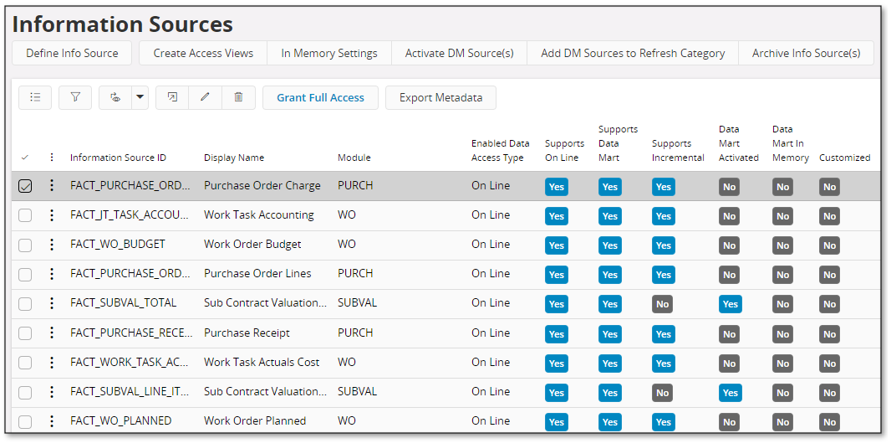
Figure 1: Information Sources page
Available commands related to Information Sources are presented below.
Define Info Source¶
The Define Info Source opens up an assistant that can be used to create new Information Sources. Basically the general information, access information and items/attributes are defined. All created information has to be investigated and more info also has to be added to get a useful Information Source.
Create Access Views¶
The Create Access Views command opens up an assistant that can be used to create Access Views based on one or more Information Sources.
Activate DM Source(s)¶
If it is required to activate the Data Mart version for one or more Information Sources, use the command Activate DM Source(s). The command will open an assistant where one or more Information Sources can be selected. Read more about how to manage Materialized Views.
Note: It is important to set the correct Enabled Data Access Type for each activated Information Source in order to be able to access the Data Mart version via IFS Business Reporter.
Add DM Sources to Refresh Category¶
The command Add DM Sources to Refresh Category opens up an assistant that an be used add Data Mart sources associated with an Information Source to a specific refresh category. It is possible to add the Data Mart sources to a new refresh category or to an existing category. Selecting Data Mart sources is supported by the following options:
- Select All DM Sources
All Data Mart sources referenced by the Information Source will be selected. This means Data Mart sources that are directly referenced by the Information Source and all indirectly referenced Data Mart sources via e.g. connected dimensions. - Select only Directly Related DM Sources
Only Data Mart sources that are directly referenced by the Information Source will be selected. Data Mart sources that are referenced by e.g. connected dimensions will NOT be selected. - Select only Dimension DM Sources
Only Data Mart sources referenced by dimensions connected to the Information Source will be selected.
More details on Data Mart Refresh Category
Archive Info Source(s)¶
Use this option to archive the current state of the metadata definitions for on or more Information Sources.
Grant Full Access¶
The Grant Full Access command is only available when selecting one or more Information Sources, and leads to navigation to the Information Source Full Access page.
Export Metadata¶
The Export Metadata command is only available when selecting one specific Information Source, and it can be used to export the metadata of the Information Source as an INS file.
Information Sources - In-Memory¶
If Oracle Enterprise edition is used and the In-Memory option is available the Information Sources page will support the command In Memory Settings.

The command will start en assistant where In Memory settings are defined.
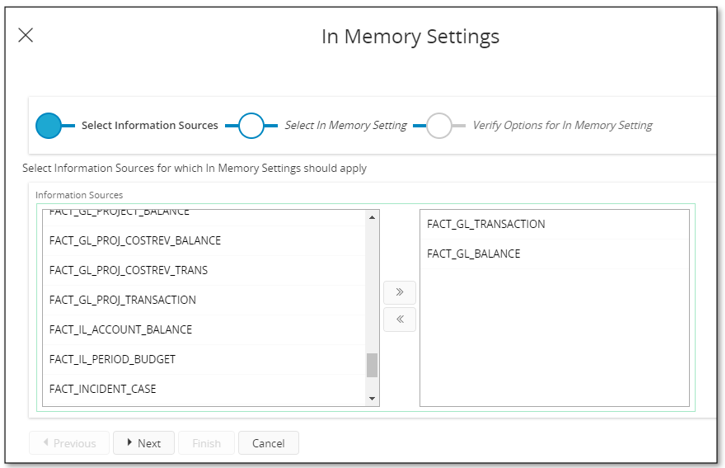
First the Information Sources are selected.
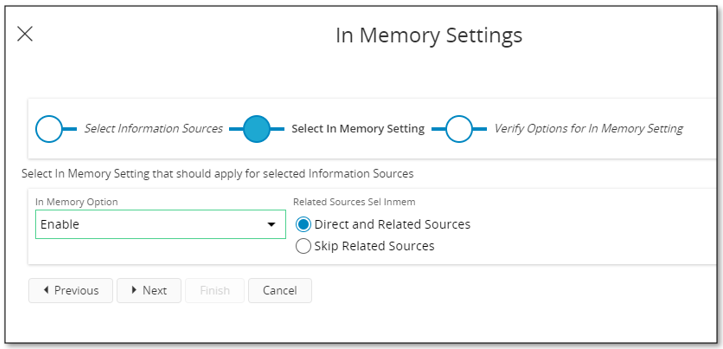
Next the In Memory settings are supplied.
- Select In Memory Option
- Enable
- Disable
- Select option for related Data Mart sources
- Direct and Related Sources
- Skip Related Sources
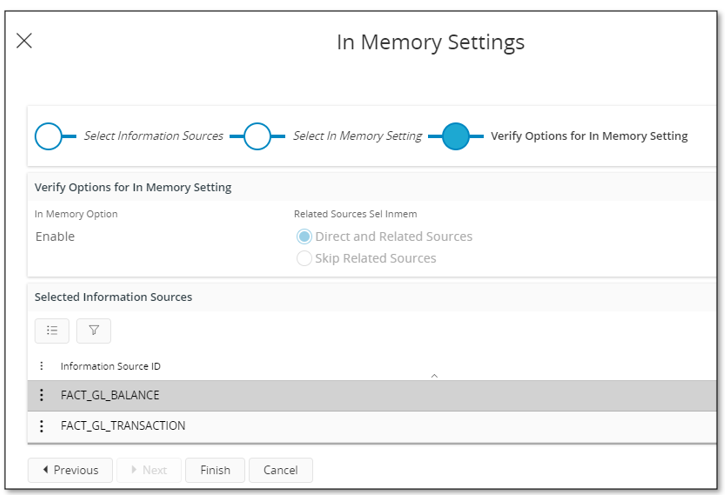
In the last step the settings are verified. If ok, press Finish to start adding the Data Mart sources In Memory. -
Information Source Details¶
Navigate to the Information Source detail page from Information Sources overview page by selecting one or more Information Sources and then using the standard go-to-details button.
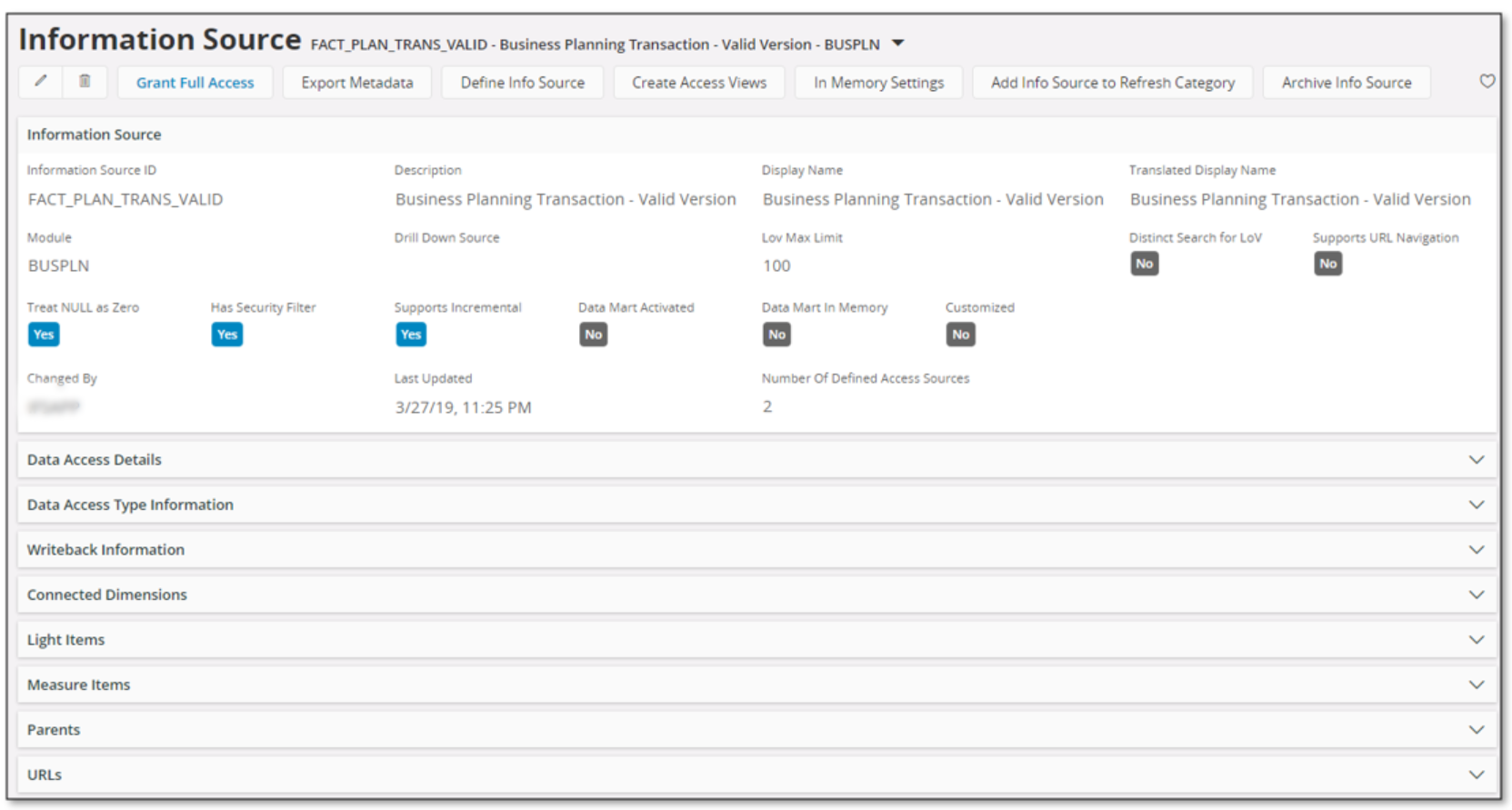
The page has a header part and a number of detail sections.
The following information is available in the header:
| Attribute | Description |
|---|---|
| Information Source ID | Identity of the Information Source (Fact). Recommended to prefix with FACT_. Unique. |
| Description | Description of the Information Source, what it represents, where data is fetched from etc. |
| Display Name | The Prog display name of the Information Source. This text will during translation handling be transferred to the translation framework. |
| Translated Display Name | Shows Display Name in current language |
| Module | Name of the module that owns the data source. |
| Drill Down Source | Identity of a Information Source that is a child data source to the current Information Source. Note: A drill down data source represents detail information (transaction level) while the master (current template) represents aggregated transaction information. |
| LoV Max Limit | Max number of rows to be retrieved when collecting List of values. For Information Sources the value should be set to a rather small number, like e.g. 100. |
| Distinct Search for LoV | In most cases defined as No, i.e. no distinct search when creating LoV queries based on Fact items. |
| Supports URL Navigation | Defines if the Information Source supports URL navigation to IFS Cloud. |
| Treat Null As Zero | Defines if NULL values of measure attributes in the Information Source should be treated as zero (0) when retrieving data. Note: Only affects the selection from the database |
| Has Security Filter | Indicates that the Information Source supports security filters. For such an Information Source it is possible to grant full access to an end user. |
| Supports Incremental | Indicates if incremental load is supported (applies to data mart) |
| Data Mart Activated | Indicates if the data mart storage has been activated |
| Data Mart In Memory | Indicates if the associated main data mart source is available for In Memory access |
| Customized | Indicates if the Information Source has been customized |
| Changed By | Last user that installed/changed the metadata of the Information Source |
| Last Updated | Timestamp when the Information Source metadata was last updated |
| Number of Defined Access Sources | Number of access sources that the Information Source supports |
| Data Access Details | |
| Enabled Data Access Type | Defines the enabled/supported data access type(s). If not defined it will be set to a NotDefined type. The general idea is to always develop online support for an Information Source and then the OnLine type should be used. If data mart support is also developed and available then the DataMart type can be used. It is also possible to use an All type that defines that both on line and data mart is supported. |
| View Handling Type | Defines what type of view to be used when accessing this information source. If the value is Std then the standard view will be used. If the value is UseOptional then the optional view will be used. If the value is AlternativeOrStd then the alternative view will be used if the interface Decide Alternative View Api returns TRUE, else the standard view will be used.The purpose is to be able to provide views with e.g. different security mechanisms. |
| Data Access Type Information | |
| Data Access Type | Either Data Mart or On Line |
| View Name | Standard access view name for the access type. |
| Optional View Name | Optional access view name for the access type. It is important that the optional view supports the same columns as the standard view. A typical usage is an Information Source view without row level security. Row level security implementation can cause performance problems and if the customer accepts access of an Information Source without this security then a switch can be made to the optional view. |
| Custom View Name | Access view for the access type if the Information Sources has been customized. |
| Custom Optional View Name | Optional access view for the access type if the Information Sources has been customized. |
| Hint Definition | An optimizer hint definition to be added to the SELECT statement when retrieving Information Source information. Opens up the possibility to performance trim/enhance executions for this data access type. |
| Default Data Access Type | Defines is the access type should be the default data access type for this Information Source. |
| Writeback Information | |
| Writeback Category | Defines the Writeback category as one of: AdvancedWriteBack, GeneralWriteBack |
| Supported Writeback Aggregation Level | Defines the supported Writeback aggregation level. The default value will be Aggregated which represents the Writeback functionality supported before IFS Applications 10. From the IFS Applications 10 release, IFS Business Reporter will also support Writeback on transaction level but this is only possible if the Writeback Interface related to the Information Source supports this type of Writeback. An Information Source can support aggregated Writeback, transaction level Writeback or both. Valid values for the property are Aggregated, Transaction, All |
| Writeback Interface | Name of the PL/SQL API to be called after having posted all write back information. The API is specified according to: <PackageName>.<ProcedureName> API details for category: > AdvancedWriteBack: The API has the responsibility to process all posted data, handle partial rollback, error handling, response to IFS Business Intelligence Services etc. It is required that the procedure declaration looks as follows: > > <br>> <PackageName>.<ProcedureName>(<br/> process_status_code_ OUT PLS_INTEGER,<br/> message_ OUT VARCHAR2,<br/> write_back_master_id_ IN NUMBER);<br>> > > GeneralWriteBack The API will receive transactions packed in a standard IFS attribute string and the API only has to figure out what to do with the retrieved data. It is required that the procedure declaration looks as follows: > > <br>> <PackageName>.<ProcedureName>(<br/> attr_string_ IN VARCHAR2);<br> |
| Writeback Supports Storage of File | Defines if the Excel book/file should be saved in the database during write back. Implies that the write back interface takes care of the saved files (typically for advanced write back) Default set to cleared. |
| Stop Writeback Processing on Error | Only considered for write back category GeneralWriteBack. Selected means that the write back processing will be stopped/aborted as soon as an error occurs in the write back API. The complete write back will be rolled back. Cleared means that all transactions/records will be processed. Errors reported by the write back API will be reported as a write back row error and all database operations handled for the current transaction/record will be rolled back. |
| Modified Writeback Supported | Defines if modified write back is supported. This option only applies to advanced write back. It will allow write back of only modified values instead of doing a complete write back, which id the default behavior. |
Information Source Dimensions¶
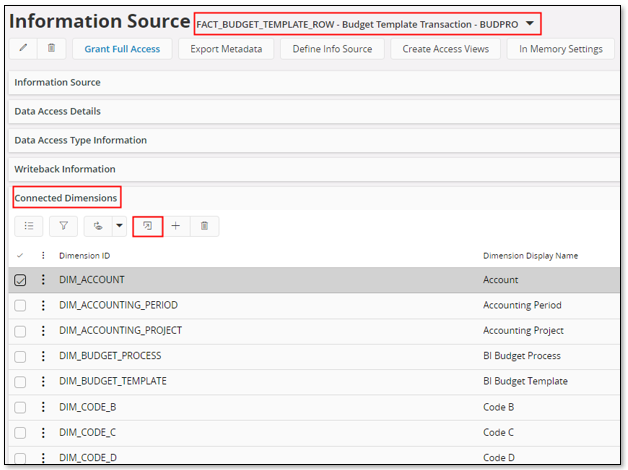
The Connected Dimensions section shows an overview of dimensions connected to the Information Source. Details are presented in a separate page. Select one or more of the dimensions and the use standard go-to-detail comman/button.
For more information about metadata related to Dimensions connected to an Information Source, read here.
Information Source Items¶
The fact part of the an Information Source consists of two types of items:
- Measure Item A measurable item like amount, quantity etc.
- Light Item A non-measurable item like note, date etc
Both items have the same detail specification. Expand one of the sections Light Items or Measure Items in the Information Source detail page.
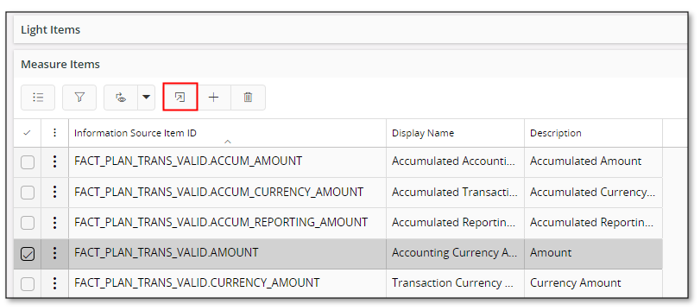
Select one or more items, and user the standard go-to-detail command/button to navigate to the a detail page.
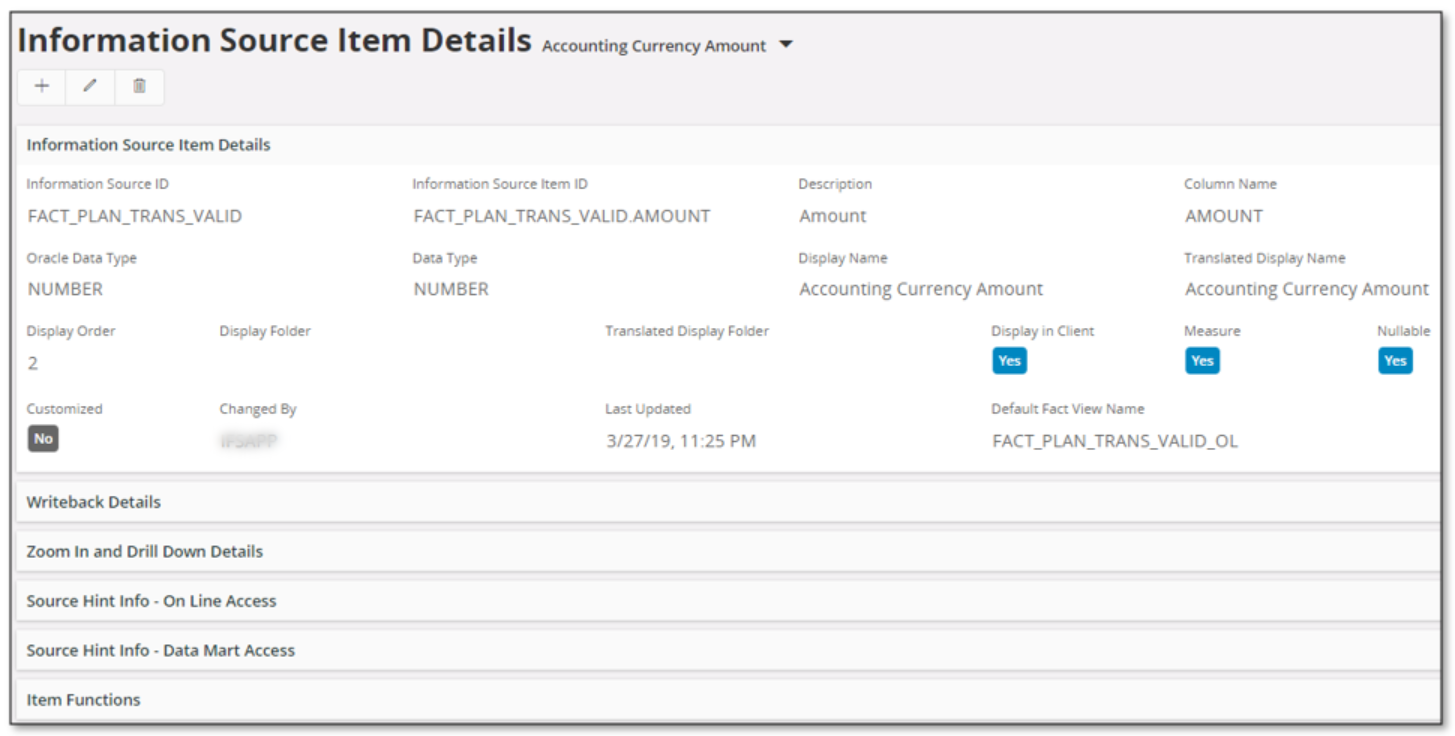
The following information is available:
| Attribute | Description |
|---|---|
| Information Source Item Details | |
| Information Source ID | Identity of the Information Source that the item belongs to. |
| Information Source Item ID | Identity of the item. Normally defined as <InformationSourceId>.<ViewColumnName> e.g. FACT_GL_BALANCE.BALANCE. Unique |
| Description | Description of the item, what it represents etc. |
| Column Name | Column name in the Information Source access views that represents the item value. |
| Oracle Data Type | Data type for the item in the Oracle database Can be one of DATE, NUMBER, TEXT |
| Data Type | Data type for the item as defined in model. Can be one of TEXT, INTEGER, NUMBER, CURRENCY, DATE, DATETIME, TIME |
| Display Name | The Prog name of the item. This text will during translation handling be transferred to the translation framework. |
| Translated Display Name | Shows Display Name in current language. |
| Display Order | The order that the item will appear in the source navigator among items for the Information Source. Normally the measure items are placed first, starting with 1 and the light items are placed last and given a higher start order number starting with e.g. 101 |
| Display Folder | Defines a sub folder in the source navigator where the item will appear. Specified as e.g. \Measurable Items. Default value is NULL |
| Translated Display Folder | Shows Display Folder in current language |
| Display in Client | Selected if the item should be visible to the end user in a client like IFS Business Reporter. All dimension reference identities and joiners (attributes to support on line join) should have not have this attribute set, since such attributes are of no interest for an end user. |
| Measure | Indicates if the item is a Measure. Else it is a so called Light item. |
| Nullable | Indicates if the item can be null in the data source |
| Customized | Indicates if the item is a customized item or not |
| Changed By | Last user that updated the metadata if the item |
| Last Updated | Timestamp when the item metadata was last updated |
| Default Fact View Name | The access view that currently is set as the default one |
| Writeback Details | |
| Write Back Type | The enumeration specifies the requirements that the write back interface has on each item. The following values can be supplied:
|
| Write Back Identity | Identity of the item id that can be interpreted by the API that has the responsibility to process the write back data, e.g. an attribute name in an entity specific attribute string. |
| Write Back Display Order | The display order for this item in Write Back controls. Note: This attribute should be synchronized with Write Back Display Order available for write back dimension items associated with the current Information Source |
| Writeback Value Generated in Server For New Records | Indicates if the writeback interface is able to generate a value for this attribute when writing back new records. This property can be used by attributes in Information Sources supporting aggregated as well as transaction level writeback. |
| Zoom In and Drill Down Details | |
| Enable Zoom In | Indicates if the item supports Zoom In, i.e. if the client should enable Zoom In design controls for this item. Should always be cleared if the item is a non-measurable item. |
| Zoom In Display Item | Indicates if the item should be displayed when generating Zoom In details. By default a Information Source supports Zoom In to itself. |
| Zoom In Display Order | Display order of Zoom In items in design controls and when presenting the Zoom In result in new work sheet. Note: Should be synchronized with Zoom In Display Order available for dimension item detail handling associated with an Information Source. Suggested display order is:
|
| Enable Drill Down | Indicates if the item supports Drill Down, i.e. if the client should enable Drill Down design controls for this item. Note: This item can be selected only if there is a natural drill down source available for the current Information Source Should always be set cleared if the item/attribute is a non-measurable item. |
| Drill Down Key | Indicates if this item/attribute in the current Information Source represents a key column in the drill down data source. Must be known to correctly handle the Drill Down functionality. E.g. the attribute FACT_GL_BALANCE.COMPANY_KEY in Info Source FACT_GL_BALANCErepresents a key column in the target/drill down source FACT_GL_TRANSACTION.Drill Down Source Item Id should be used to define the target item/attribute in the drill down source. |
| Drill Down Display Item | Indicates if the item should be displayed when generating Drill Down details. Note: If the current Information Source can act as a Drill Down data source then items should most likely be displayed, else the attribute Drill Down Display Item is always cleared. |
| Drill Down Source Item Id | Item identity of a column in the drill down data source that corresponds to the item in the current data source. There are two usages for this item:
|
| Drill Down Display Order | Display order of Drill Down items in design controls and when presenting Drill Down result in new work sheet. Note: Should be synchronized with Drill Down Display Order available for dimension item detail handling associated with a Information Source. Suggested display order is:
|
| Source Hint Info - On Line Access | |
| Hint Type | Defines the hint type for the current item. The following values are supported:
|
| Item Hint Indicator | Indicates of the hint is regarded as good, bad |
| Visible In Client | Indicates if the hint is visible in the client |
| Source Hint Info - Data Mart Access | |
| Hint Type | Defines the hint type for the current item.. The following values are supported:
|
| Item Hint Indicator | Indicates of the hint is regarded as good, bad |
| Visible In Client | Indicates if the hint is visible in the client |
Information Source Item Functions¶
For each light or measure item it is possible to assign one or more advanced parameter functions. The purpose is to support definition of parameters based on advanced functions in IFS Business Reporter. Most common usage is for Light items.
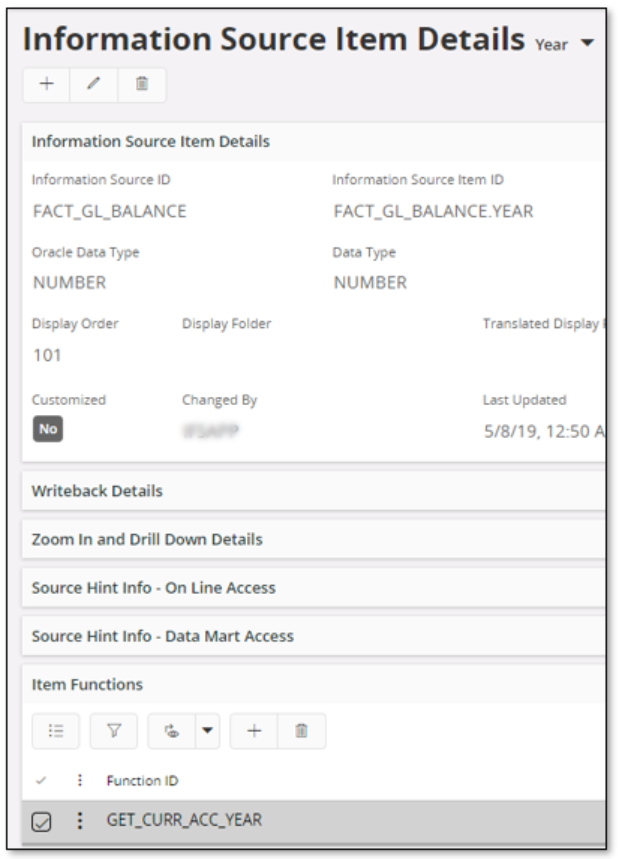
| Attribute | Description |
|---|---|
| Function ID | Identity of a BR Parameter Function that is associated with the Information Source item/attribute. |
Information Source Parents¶
Parent information can be defined for an Information Source and is mainly used to support List of values functionality. The parent items are always dimensions items and they have to be available in the client to correctly support List of values for light or measure items.
Example: The Information Source FACT_GL_BALANCE contains accounting balances for each financial company. If we want to show List of values for an item in this Information Source, the company identity must be known to make the data meaningful. In the Information Source itself the unique company identity is available but not visible and to be able to refer to this identity we have to make use of the the dimension DIM_COMPANY to indirectly get the identity of the company. A natural choice is the dimension item corresponding to the company code. The only dimension that should have a visible company code attribute is the dimension DIM_COMPANY so for that reason we define the dimension item DIM_COMPANY.CODE. After having supplied this information in the Meta Data, the client will always try to make sure that the company code has been specified before creating the List of values.
For the current Information Source, expand the section Parents.
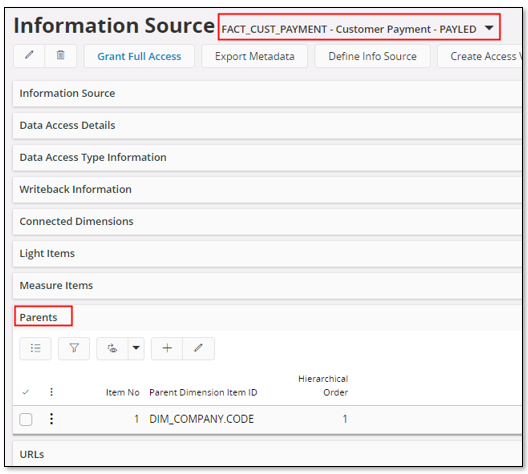
The following information is available:
| Attribute | Description |
|---|---|
| Item No | Parent item number (row number). Key |
| Parent Dimension Item ID | The identity of a dimension item that must be available in the client to enable parent identification of a Information Source. |
| Hierarchical Order | Hierarchical order of the defined Information Source parent keys. Lowest number has the highest rank. |
Information Source URLs¶
For an Information Source it is possible to specify URL related information. The URLs' are used when navigating from Zoom In or Drill Down level in IFS Business Reporter to a page in IFS Cloud Web.
For the current Information Source, expand the URLs section.
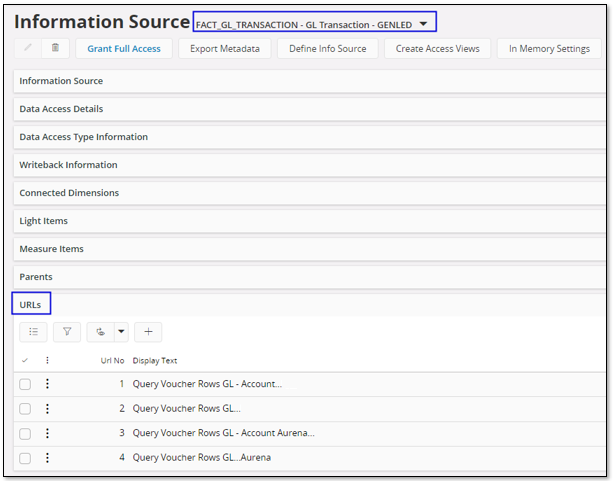
The following information is available:
| Attribute | Description |
|---|---|
| URL No | URL number (row number). Key |
| Display Text | This is the Prog text to be displayed as RMB option in Zoom In or Drill Down details, enabling the URL navigation. |
To see details, select one or more URLs and then use the standard go-to-detail command/button.
Information Source URL Details¶
Details about a URL is found in the Information Source URLs page. The URL info is found in URLs section in the Information Source page.
Below is an example of an IFS Cloud Web client specific URL:
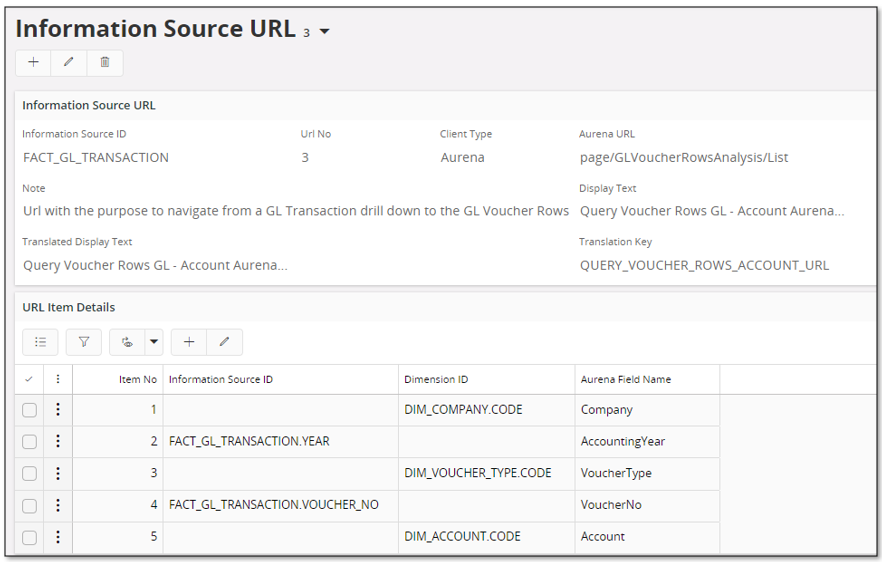
| Attribute | Description |
|---|---|
| Information Source URL | |
| Information Source ID | Identity of the Information Source (data source). Parent key. |
| URL No | URL number (row number). Key |
| Client Type | Defines the client type that the URL applies to.
|
| Aurena URL | URL string to be executed when navigating to IFS Cloud Web client. A URL string for IFS Cloud Web access is defined in the following way: page/<client name>/<page name> E.g. page/GLVoucherRowsAnalysis/List Note: The following parameter must be defined to make the IFS Cloud Web specific URL work properly: URL for IFS Cloud Web Client (IFS_CLIENT_LOCATION) for IFS Cloud Web access. For more information, look up information about BR System Parameters. |
| Note | A note about the purpose of this URL |
| Display Text | This is the Prog text to be displayed as RMB option in Zoom In or Drill Down details, enabling the URL navigation. |
| Translated Display Text | Derived attribute that contains the translated Display Text according to the current language. |
| Translation Key | A string that is used as identification in the translation framework, e.g. a translation key. If several data sources have the same URL then the translation key should be the same. E.g. QUERY_VOUCHER_ROWS_URL |
| URL Item Details | |
| Item No | Item number. Key |
| Information Source Item ID | Information Source item identity if the current item is represented by a Information Source item, else NULL. |
| Dimension Item ID | Dimension item identity if the current item is represented by a dimension item, else NULL |
| Entity Attribute Name | This is the name of the column in the old IFS Cloud client that the URL referred to. Note: The Entity Attribute Name attributes only applies to old URLs and is there to support migration from old URL to new IFS Cloud Web URL- |
| Aurena Field Name | This is the name of the field in the target IFS Cloud Web page that the URL points to, used as query condition when building the URL. |
Example Aurena URL¶
Assume that URL for IFS Cloud Web Client is https://lkpxyz111.corpnet.ifsworld.com:48080/main/ifsappliations/web/ (defined via BR System Parameters) and that the Aurena URL is page/GLVoucherRowAnalysis/List.
Also assume that the URL requires the following items:
- Dimension item DIM_COMPANY.CODE with Aurena Field Name=Company
- Info Source item FACT_GL_TRANSACTION.YEAR with Aurena Field Name=AccountingYear
- Dimension item DIM_VOUCHER_TYPE.CODE with Aurena Field Name=VoucherType
- Info Source item FACT_GL_TRANSACTION.VOUCHER_NO with Aurena Field Name=VoucherNo
If the detail items are available in e.g. the Zoom In detail sheet, generated by IFS Business Reporter (BR), then the URL will in the BR report be enabled as an RMB option that will execute the following URL string:
https://lkpxyz111.corpnet.ifsworld.com:48080/main/ifsappliations/web/page/GLVoucherRowsAnalysis/List;$filter=Company eq <value> and AccountingYear eq <value> and VoucherType eq <value> and VoucherNo eq <value>
where <value> is the value for each item found on the current detail transaction row.
E.g.
https://lkpxyz111.corpnet.ifsworld.com:48080/main/ifsappliations/web/page/GLVoucherRowsAnalysis/List;$filter=Company eq '900' and AccountingYear eq 2007 and VoucherType eq 'J' and VoucherNo eq 200700000